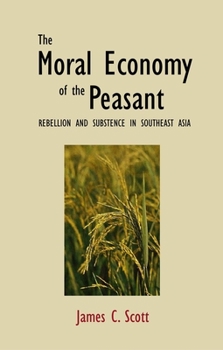The Moral Economy of the Peasant: Rebellion and Subsistence in Southeast Asia
Select Format
Select Condition 
Book Overview
"This work is a profound and fundamental contribution to the issues addressed."--Sociology "Vital to an understanding of peasant politics."--Library Journal James C. Scott places the critical problem of the peasant household--subsistence--at the center of this study. The fear of food shortages, he argues persuasively, explains many otherwise puzzling technical, social, and moral arrangements in peasant...
Format:Paperback
Language:English
ISBN:0300021909
ISBN13:9780300021905
Release Date:September 1977
Publisher:Yale University Press
Length:254 Pages
Weight:0.60 lbs.
Dimensions:0.5" x 5.2" x 7.9"
Customer Reviews
3 ratings
The nature of the Southeast Asian state revealed
Published by Thriftbooks.com User , 15 years ago
In this critically underread book, arguably the central thesis of his work in Southeast Asian studies, Scott forcefully demonstrates that not only is the modern state unnecessary to the everyday life of a Southeast Asian peasant, but that the success of a Southeast Asian state depends in no small part on leaving the peasants to their own devices. Due to the existence of local security nets, predating the formation of the state, that they already pay into, peasants have already been "taxed" and rewarded with their primary goals-- a steady food supply and protection from criminals-- before the state ever reaches them. Furthermore, the bureaucratic Southeast Asian states seem to be utterly clueless or purposefully ignorant as to the dramatic variations on crop yield from year to year. Unlike the ancient patron-client system which expects annual variations, the state demands the same tax every year, or sometimes even increasing taxes to fund some special project, a system which can easily bankrupt peasants and force them to sell critical possessions such as food animals, plows, and their own clothing. States which see the peasantry as a bottomless, untapped source of wealth write the script for their own downfall due to peasant rebellion, or in the worst case, mass starvation. States that leave the peasants alone prosper. But in any form the state resembles nothing less than organized robbery; they give the peasants very little in exchange for the taxes. Using his years of field research, Scott links the historical injustices of the Southeast Asian state to modern political problems as well.
The Problem of Subsistence in a Capitalist Economy
Published by Thriftbooks.com User , 17 years ago
Traditionally, Marxist analyses have taken `exploitation' as a uniform relationship, mostly referring to an unjust transfer of `surpluses' from the lower strata to the upper ones, which creates resentments among the former and eventually results in mass rebellions. Contrary to the conventional Marxist thinking, James Scott believes that the "nature of exploitation" is as important as the exploitation itself (p. 4). In his The Moral Economy of the Peasant: Rebellion and Subsistence in Southeast Asia, Scott sets out to solve the puzzle why some types of exploitative relations give way to grassroots revolutions and others not. Scott complains that approaches to exploitation hitherto have been "too one-sidedly materialistic," (p.165). Accordingly, his goal is to shed light to the moral/psychological aspects of rebellions and thus fill an important gap in the analyses of exploitation and rebellions, for "the problem of rebellion is not just a problem of calories and income but is a question of peasant conceptions of social justice, of rights and obligations, of reciprocity," (p. vii). The key elements in Scott's analysis are norms of reciprocity in a society and right to subsistence of the members of that society. Scott argues that traditional (pre-capitalist) societies differ substantially from modern (capitalist) societies with respect to these two elements. Traditional societies in general maintain a "subsistence ethic" that prefers safety and reliability to long-run profits (p. 13). This "safety-first" principle leads peasants to favor those institutions that "minimize the risks to subsistence", although they may claim much of the surplus (p. 55). On the other side, informal relations between the members of traditional societies provide means to secure the survival of individuals. Collaborative family and kinship ties as well as tacit tenancy and citizenship rights and obligations set up "safety valves" that rescue individuals at times of adversity: "a family that is hard-pressed will expect help from others who have fared better and will expect to reciprocate when the situation is reversed," (p.168). The relationship between the landlord and his tenant are quite paternalistic in traditional societies. The landlord undertakes the risks of cultivation and gives financial assistance to his tenants. The tenant is considered "an inferior member of the extended family" of landlords in these societies (p.186). Thus, tenants under the traditional system "seem willing to put up with its injustices for the compensating security," (p. 37). By contrast, Scott argues that commercialization of agriculture and agrarian class relationships in capitalist societies strip the individual from the "security valves" of the traditional ones. In his in-depth analysis of the Burma and Cochinchina cases, Scott demonstrates that the intrusion of capitalist economic system into, and the integration with the world economy of, these regions throughout the
Here's a review that'll never be read....
Published by Thriftbooks.com User , 23 years ago
Honestly, I am enthralled by the work of this man. Writing against the premise that profit maximization is (or should be) the goal of individuals in developing countries, Scott's thesis is that peasant social order is predicated on the fact that the worst-case scenario is starvation. Peasants seek to minimize the risk of this, and as such, to not maximize profits.... which is what the 'West' has tried to force them to do.... (and failed...)I do not know who you are who is reading this review. I am a student of political economy specializing in South Asia.... for my studies into the rise of Sinhalese nationalism in Ceylon, this book was invaluable. I'd read this book just for fun, too.... This book is a must read, though, for any student of south and east asian development, agricultural development, or developmental theory in general. Bon chance.




